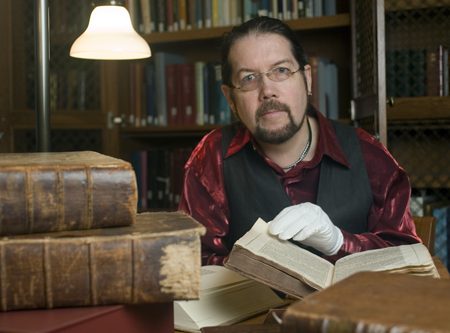
If you think you’re the only person who doesn’t have a good understanding of Shakespeare, you’re not alone.
There are still many mysteries involving the great playwright, said world-renowned Shakespeare scholar Gary Taylor of The Florida State University, which is one reason that Oxford University Press (OUP) is planning a new edition of the bard’s collected works. Another reason involves rethinking how to present Shakespeare to today’s students — the Facebook generation.
OUP has named Professor Taylor lead editor for the new edition, and it’s no wonder. The award-winning writer and editor has a history of overseeing complex projects and is founder and director of Florida State’s unique, interdisciplinary History of Text Technologies program.
"What Shakespeare actually wrote is not at all obvious," Taylor said. "We have no manuscripts that are indisputably in his own handwriting. Many of his best-known works were published after his death. All the earliest texts are full of errors, and they all lack information that we expect in a modern script or book. Moreover, there is more than one early text for some of Shakespeare’s best-known works, including ‘Hamlet,’ ‘Othello,’ ‘Romeo and Juliet,’ ‘King Lear,’ ‘Richard III’ and ‘The Taming of the Shrew.’
"Determining exactly what Shakespeare wrote, what it meant, how it should be performed, these are questions at the center of an enormous, international frenzy of historical research," Taylor said.
Taylor would know. He served as general editor of "Shakespeare’s Complete Works," published by OUP in 1986. In 2009, his "Thomas Middleton: The Collected Works" won the Modern Language Association’s prize for the world’s most "distinguished scholarly edition" published in the previous two years, and it firmly established Middleton as "our other Shakespeare." Four other works by Taylor appear on the Random House/Modern Library list of the world’s best 100 books on Shakespeare.
OUP gave Taylor the freedom as lead editor to choose his collaborators on "The New Oxford Shakespeare," which will be available in both print and digital formats in 2016, the 400th anniversary of Shakespeare’s death.
"When OUP asked me to take this new project on, I said I would do it only if I could find collaborators who would be intellectually stimulating, who would make it interesting for me to return to the field of Shakespeare editing," Taylor said. "That’s true of all five of my collaborators. And I didn’t want to surround myself with people who would be afraid to talk back."
Those collaborators include two general editors, one in England and one in the United States. They are Professor John Jowett, deputy director of the Shakespeare Institute at the University of Birmingham in England, and Associate Professor Terri Bourus of Indiana University/Purdue University Indianapolis. Taylor and Jowett worked together on the 1986 Shakespeare edition. Bourus comes from a literary and theater background and is, said Taylor, a "card-carrying member of the Equity actors’ union."
"All of the members of the team are brilliant, but they are also brilliant in different, complementary ways," Taylor said. "My guide in putting together the team was the way that my own mentor, Professor Stanley Wells, assembled his team of editors in the 1970s when he was head of the Shakespeare department at Oxford University Press. He was and still is a good listener who encouraged a team spirit and did not micromanage."
Taylor was a co-editor on Wells’ team in the 70’s. Back then, all the editors worked together in a small set of rooms in Oxford. In contrast, on the Middleton project that began a decade later and took 20 years to complete, Taylor was leading a team of 75 scholars in 12 countries.
"With most of them, I had very little face-to-face contact," Taylor said, "but it was important to have so many collaborators to demonstrate that Middleton appeals to critics from so many different backgrounds, working from very diverse perspectives. However, for ‘The New Oxford Shakespeare’ I want to go back to a small team of people working closely together, because that is the best way to produce revolutionary results that are coherent across the whole Shakespeare canon."
With its members based in Indianapolis, the United Kingdom and Tallahassee, Taylor’s team will frequently rely upon 21st century technology such as file sharing, e-mail and Skype.
They also will fold the latest technology into the digital edition of "The New Oxford Shakespeare’ to create far more than a traditional book. While Bourus has said the new edition will include clips from film and stage versions of Shakespeare’s plays, Taylor is hesitant to give away more details.
"I will be actively pushing for a multipronged digital presence," he said. "After all, as director of the History of Text Technologies program, I’m very aware of how new communications media have transformed the history of culture. We are living in a period of explosive expansion for text media, which will surely transform the way that we receive, teach and understand Shakespeare.
"’The New Oxford Shakespeare’ will contain plenty of surprises," said Taylor, "but I don’t want to say what they will be because that would ruin the surprise."




